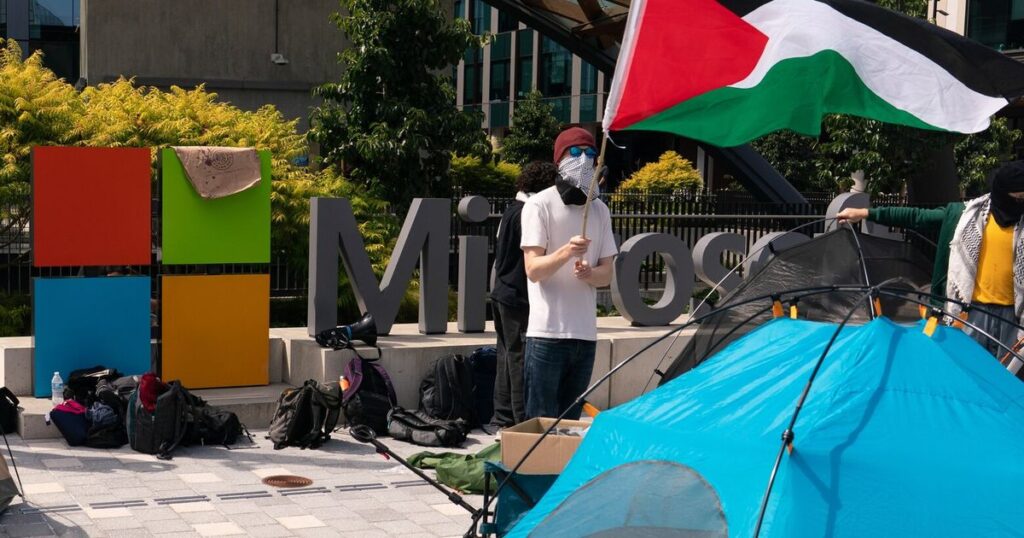Microsoft employees have started setting up a protest encampment at the company’s Redmond headquarters, ratcheting up a campaign calling for company to stop doing business with Israel over its war in Gaza.
Protesters started gathering Tuesday afternoon at a plaza at the center of a recently redeveloped portion of the company’s main campus, which extends over about 500 acres in Redmond. They circulated a 3,300-word declaration outlining their aims and invited Microsoft executives to come to the negotiating table.
As the activists began chanting in front of a handful of pitched tents, several blue-and-white security vehicles converged on driveways near the plaza as employees took meetings and munched on pizza nearby. Later a police vehicle pulled up to the plaza.
Addressing “friends and colleagues” through a microphone, former Microsoft employee and protest leader Hossam Nasr said: “Welcome to the liberated zone.”
“We are here because over 22 months of genocide, Israel — powered by Microsoft — has been killing, maiming Palestinian children every hour,” he said.
A Microsoft employee group, No Azure for Apartheid, has for more than a year been pushing Microsoft to end its relationship with Israel, saying use of the company’s products is contributing to civilian deaths in Gaza. Azure, the company’s cloud-computing division, sells on-demand software and data storage to businesses and governments, including Israeli government and military agencies.
A handful of No Azure for Apartheid organizers have been fired, for holding what Microsoft said was an unauthorized event on campus and disrupting speeches by executives. “Microsoft is the most complicit digital arms manufacturer in Israel’s genocide of Gaza,” Nisreen Jaradat, a Microsoft employee, said in a statement on Tuesday.
Microsoft didn’t immediately respond to a request for comment. In a blog post published in May, the company said it had “found no evidence to date that Microsoft’s Azure and AI technologies have been used to target or harm people in the conflict in Gaza.”
But Microsoft said this month that it had enlisted the law firm Covington & Burling to conduct a further review after a report that Israel’s military surveillance agency intercepted millions of mobile phone calls made by Palestinians in Gaza and the West Bank and stored them on Azure servers. That trove helped inform the selection of bombing targets in Gaza, according to reporting by the Guardian newspaper, Israeli-Palestinian publication +972 Magazine, and Local Call, a Hebrew-language news site.
The activists took their inspiration from encampment-style protests staged on at least 100 US college campuses since the war in Gaza began. Students at schools like Columbia University pitched tents and called for their colleges to divest financial holdings tied to Israel and US weapons makers, in many cases sparking disciplinary action from administrators.
(Updated with protest details, starting in third paragraph.)

